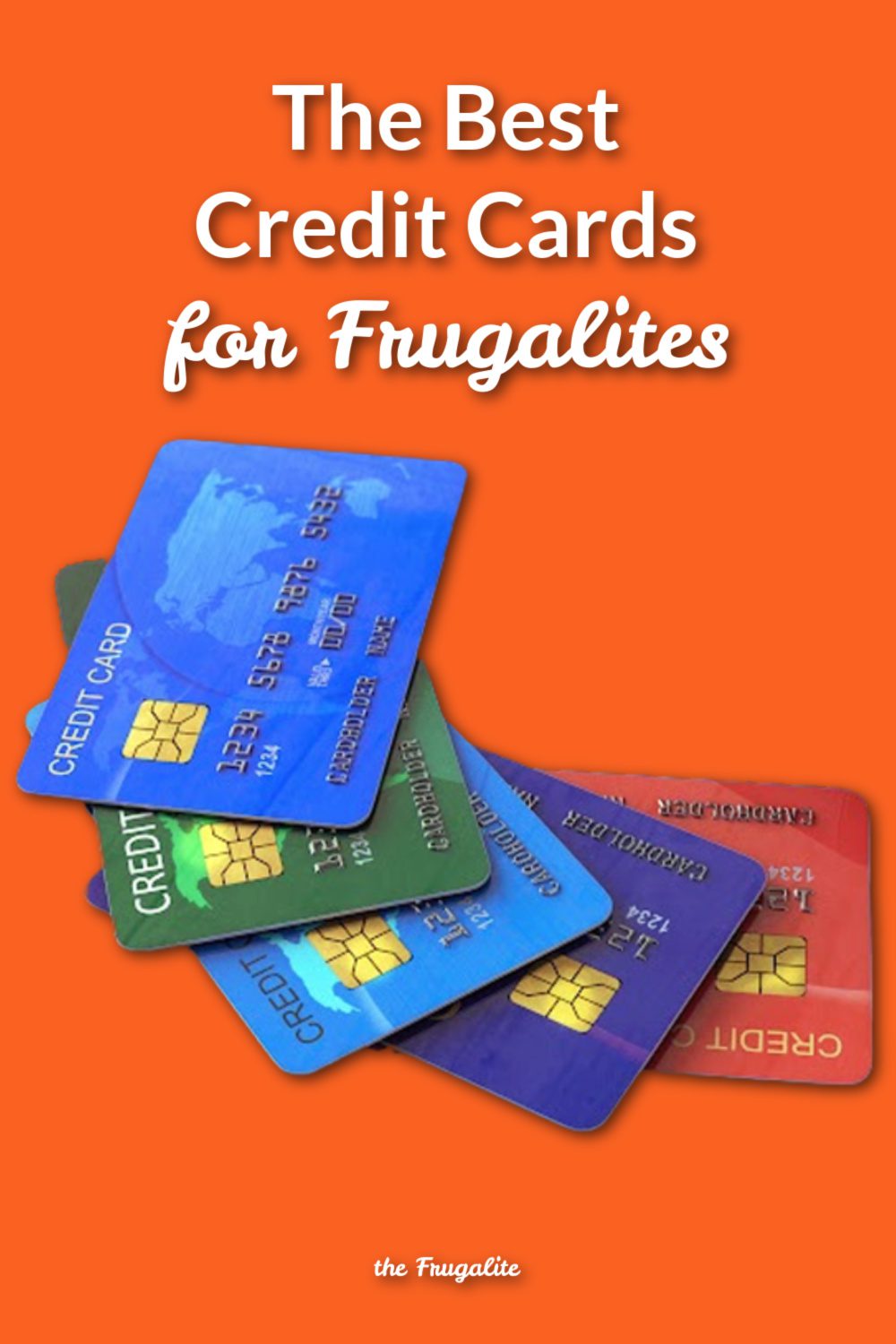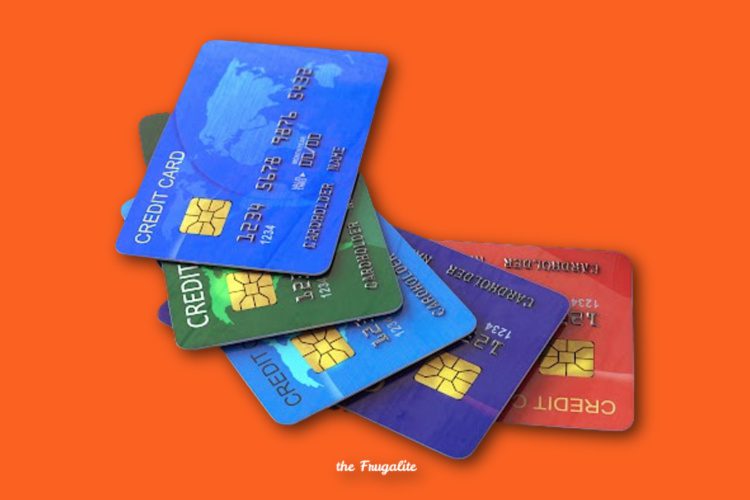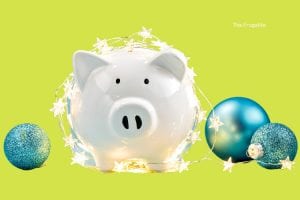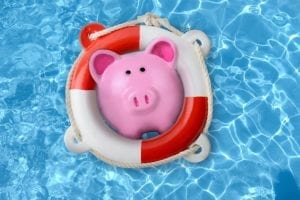(Psst: The FTC wants me to remind you that this website contains affiliate links. That means if you make a purchase from a link you click on, I might receive a small commission. This does not increase the price you’ll pay for that item nor does it decrease the awesomeness of the item. ~ Daisy)
by the author of The Faithful Prepper and Zombie Choices.
I’ll start off with the caveat that credit cards can be incredibly dangerous to those who cannot handle them responsibly. Just like beer, cars, kitchen knives, pet tarantulas, and just about anything else out there. For years, I’d followed Dave Ramsey to a tee. If he said to do something, I did it. If he said to avoid something, I avoided it.
And one of the things Dave Ramsey always said to avoid was a credit card.
So, I did.
For years, I never had a credit card.
And then I went on vacation to another state. I flew in, thinking I would easily be able to rent a car. Nope. Nobody accepted cash. Nobody accepted a debit card. I was stranded at an airport thousands of miles from my home with no means of getting out.
I also quickly realized that no credit card meant I hadn’t built up any credit either. When it came time to get a loan for something I literally couldn’t go without, the bank wouldn’t touch me. It didn’t matter that I’d gone years without debt, had a stable job, or anything. I didn’t have credit, and so the bank didn’t trust me.
I needed a credit card.
Honestly, within the United States, I think it’s almost impossible to live without one. It’s a system we’ve been suckered into, and no, I do not like it, but it’s the current nature of the beast. I haven’t figured out a way around it.
You may have found yourself in something of a similar position and now are wondering, “If I have to get a credit card, I want to get the best of the best. So, what’s the best credit card for me?”
If you’re somebody who always pays off their credit card in full at the end of each month, here are what I believe to be some of the best credit cards out there for the Frugalite…
1. Your local credit union’s credit card
The more local you can keep your purchases, the better. Not only are smaller, local banks typically more pleasant to deal with, I believe there are fewer security risks here as well. You don’t have to worry as much with the little guy about your data being sold to third parties as you do with pretty much all of the big credit card companies.
Another benefit of your local credit union is that the fees and interest rates on these cards usually are much lower than what the big guys are able to offer as well. Often, there’s not even an annual fee to open up a credit card with one of your local credit unions. (In contrast with 45% of major cards having an annual fee.)
No, there likely won’t be all the fancy features like airline miles, cashback, or points, but for somebody who is mainly concerned with a better degree of privacy (albeit, not by a lot), likely a smaller risk of being hacked, lower fees, and a simple means of building credit, this is it.
2. Wells Fargo Active Cash
For the Frugalite who is mainly concerned with saving money, this is a credit card to check out. For starters, there’s no annual fee to hold this credit card. That’s one of the primary things we’re looking for when looking at frugal credit cards. Why do I want to be forced to pay $100/year to spend my own money? That’s stupid.
There is a cashback program with this card as well. It’s only 2% (a lot of other cards give up to 6%), but something is better than nothing. If you spend $1000 in the first three months of being granted this card, you get an intro offer of $200 as well.
All of this combined means that this is a frugal credit card for the financially-responsible Frugalite.
3. Chase Freedom Unlimited
No annual fee? Check. Cash back? Check.
Those two factors alone help to push this towards being a Frugalite-friendly credit card. You can earn at least 1.5% cashback on your purchases with this card and hit up to 6.5% cash back on some select purchases. There’s a bit of juggling involved with the cash back, but it’s a pleasant feature.
4. Chase Freedom Flex
Another Chase card, the Freedom Flex also doesn’t have an annual fee. Some cards out there have fees well over $600/year, so we want to avoid anything reminiscent of that. There’s a $200 bonus if you spend $500 in the first three months of opening this card as well.
For most people, that’s fairly easy to accomplish. Even if you’re only using your credit card for “emergency” purposes and sticking to cash with everything else, $500 isn’t really a lot of money to spend in this department. Cars breakdown, housing appliances need to be replaced, and entropy tends to cause chaos.
Getting $200 for dealing with problems you were going to deal with anyway is nice. There is a cashback program with this card – 5% – but it only applies to rotating categories that are changed on a quarterly basis.
5. Capital One Quicksilver
A necessity for the Frugalite, the Quicksilver card doesn’t have an annual fee. The cashback program isn’t great – it’s only 1.5% – but it applies to every purchase you make, every day. You don’t have to worry about rotating categories or anything like that. You’re going to get some money back. Don’t let that be an excuse for spending more, but instead, use it as a means to pay off credit card bills in the future.
There is a joining bonus with this card as well. If you spend $500 with this card within the first three months you have it, you receive a $200 cash bonus. Pretty nifty, as this amount is likely to be spent within three months’ span relatively easily, even by the Frugalite.
A necessary evil?
I detest big banks and don’t like credit cards either. But at least in my case, I was forced into getting one. If you’ve found yourself in the same boat, my first recommendation would be to read everything that Dave Ramsey and Kiyosaki have ever written.
Let them teach you what they know, learn from it, and figure out how to responsibly control your own finances. Make a budget, and then stick to it like a dog with a steak. After that, and if you’ve discovered that you too cannot live without a credit card at the moment, then I recommend checking out the above cards for consideration.
Responsible money management is a necessity if you’re going to open up a credit card. I can’t stress that enough. If you don’t think you can handle it, stay as far away as possible. But if you can, these may prove of some value.
What are your thoughts? Should we avoid credit cards completely? Have you found yourself in a similar boat? Let us know in the comments below.
(Pssst. I’m not a financial advisor, nor do I pretend to be one. This isn’t investment advice. This is just a collection of my personal thoughts on the matter.)
About Aden
Aden Tate is a regular contributor to TheOrganicPrepper.com and TheFrugalite.com. Aden runs a micro-farm where he raises dairy goats, a pig, honeybees, meat chickens, laying chickens, tomatoes, mushrooms, and greens. He has two published books, The Faithful Prepper and Zombie Choices. You can find his podcast The Last American on Preppers’ Broadcasting Network.












7 thoughts on “The Best Credit Cards for Frugalites”
If you have a credit card, use it! At least once every three months. Buy groceries or tank up the car. Something. Then log into the card’s web site the next day and pay it all off.
You’re using it like cash, and it keeps your credit rating high. Be sure to pay it right off and only buy “what you can afford to pay off the next day.”
Not using a rewards card. Use the cc at Corporate America businesses only. Auto debit full amount each month and have done this since at least 1990 (when I saw this option first offered). Beware, some issuers will only auto debit minimum payment.
I ‘m finding more and more businesses that for online sales are refusing to accept debit cards and are not set up to draft on your checking account. Cash payments for online sales have their own security and time delay problems. So some more implications of credit cards are worth knowing about.
If your identity gets hacked, I’m reading that under US law you have a much better chance of getting any resultant stolen funds restored — less so with debit cards. So understanding how such theft can happen is worth knowing. Lots of retailers sell charge card sized metal shields to enclose your wallet or purse carried charge cards to protect against electronic skimmers carried by bad guys walking close to you in a crowd and hoping to secretly learn the ID and data on your charge cards. Such protective shields are easy to buy or even make, but that’s not how the majority of such hacks are made. They can’t protect against electronic skimmers secretly slipped into charge card data acceptance machines in places like stores, gas stations, or similar. In the face of such risks, you are far better protected with a credit card where your provider takes the risk than with a debit card where your chances of getting your funds back are about zilch. Those are for in-person transactions, but what about online?
I suggest looking into the free services provided by privacy.com here
https://privacy.com/
so that you can choose alternate card numbers (and additional controls) for either one-time or limited or unlimited use for selected vendors of your choice. As long as you better understand what some of the risks of using charge cards are, you might as well better understand some of the really useful tools to protect them.
Charge cards (especially credit cards) can be exceptionally useful the more you learn about the informational tools available to help you protect them.
One disclaimer: my notes above apply to US law. I can’t claim familiarity with offshore laws or tyrants — such as in Canada where I’m reading that people who donated funds to the trucking convoy are getting black-marked for life:
Canadian banks say Freedom Convoy backers’ frozen accounts will be flagged for life
Thursday, March 10, 2022
https://www.naturalnews.com/2022-03-10-frozen-accounts-will-be-flagged-for-life.html
–Lewis
If you look at rolling over payment on your credit card as an application for an emergency loan it puts it more in perspective. Bill in Houston has it right; in particular, nothing consumable should roll over to the next month. If you go out to eat or use the card for some hobby or entertainment (nonessential shopping is entertainment), that isn’t what credit is for.
Just that small difference in perspective is why some people have a great credit rating and others rack up debt that enslaves their future earnings in return for things they probably no longer have or remember charging.
My husband and I got rid of our credit cards. Then we tried twice to rent a car. The first time, the company wanted a bank statement for the last month. The second time, the company flat out said no.
After that, I applied for one because I knew the day was going to come when either my husband or myself was going to get the phone call saying, “Mom just died,” or “Mom is dying, and you’d better get here quick.” That day came for me in 2017, and I was able to get a plane ticket and rent a car because of that credit card.
What I hadn’t expected was that when I came back, the ladies’ Bible study I attend had collected nearly $400 for me, which just about covered all my expenses while I was gone.
Eh, well, you can’t always pay off a charge on a credit card the very next day: in my experience, those charges usually take a little longer to cycle through the system than that. You should definitely pay off the entire monthly balance whenever you can, however. Just paying the minimum is a great way to get yourself deeply in debt fast with what’s essentially a high-interest loan.
I did find it rather odd, however, that you mentioned car rental places and the like refusing to take debit cards. These days, my bank’s debit card is also a credit card; has the Visa logo right there on it and everything, and on the occasions when I use it (rather rare, since most places will take my Discover card instead), local merchants will often ask whether I want the charges processed as credit or debit. As far as I can tell, this is not a recent innovation either; some twenty years ago when I was in college and needed to rent a car fast to get to my brother’s wedding, the rental company processed my debit card from the bank (a local one which was in the process of being acquired by one of the national chains) just like a credit card back then too.
I second the comment regarding the legal protections of credit vs. debit cards. I pay all of my online transactions with either PayPal or a credit card, never a debit card. When I do use a debit card, it’s linked to my secondary spending account, not to my savings. That functions to limit thefts via debit. Once a thief access your account via debit card, the money is usually gone. Just like losing it out of your pocket on the sidewalk.
Regarding gurus: Ramsay is great for rebuilding credit but a rotten stock broker. I wouldn’t take that man’s investment advice for any money! Mutual funds are a very cost-ineffective way to invest, since the fund manager takes their fee out of the proceeds before those proceeds go to the shareholders. Dividend-paying stocks are better, because dividends are paid directly into your account and if you’re using an IRA, they don’t count towards your yearly contribution minimum. If you’re using a Roth IRA, they’re free money. Boo on mutual funds!